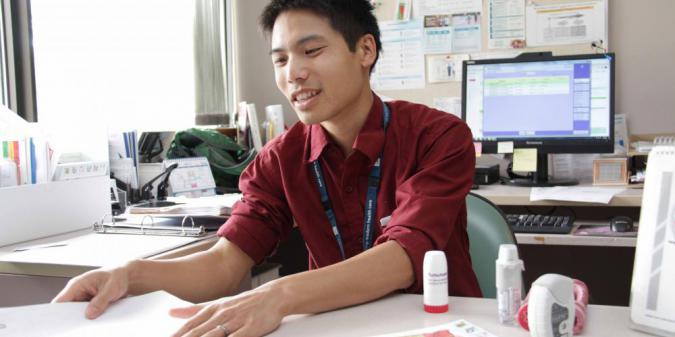Eric Cheng, respiratory therapist
HSA REPORT MAGAZINE, SEPTEMBER 2016
BY LAURA BUSHEIKIN
"I love what I do. I can't believe I get paid for it."
HSA member Eric Cheng is a respiratory therapist at Eagle Ridge Hospital in Port Moody, and a co-founder of the Canadian charity Respiratory Therapists Without Borders.
Being a respiratory therapist (RT) puts Cheng on the front lines of health care. "We're kind of like the firefighters in the hospital," he says. "We make sure people breathe."
Whether he's holding someone's hand during a difficult moment, educating a client about coping with chronic obstructive pulmonary disease (COPD), or hooking someone up to life-support, Cheng finds his work deeply meaningful.
"I realize how unrelenting death is, how fragile life is, and what a privilege it is to be alive," he says. "I have seen all kinds of people die – from babies to people of 106 or 107 years old. This reminds me to seize every moment and make the most of every opportunity."
Cheng didn't grow up expecting to work in health care. "I come from a family full of engineers. Aerospace, biomedical, civil, structural – all the engineering disciplines are spoken for." Furthermore, he says with a laugh, just about everyone in his family faints at the sight of blood. Cheng duly enrolled in an engineering program at university. A combination of "aha" moments and circumstances led to his decision to change directions.
While he enjoyed working with technology, he realized that his passion was working at the frontline with the public. During a four month co-op work term at the University Health Network at Princess Margaret Hospital, he learned that he was able to tolerate blood and made the transition to a respiratory therapy program. He switched into a joint kinesiology and respiratory therapy program at the University of Waterloo and Michener Institute that fall, and never looked back.
Cheng's passion for RT, and his drive to be of service, inspired him to found Respiratory Therapists Without Borders (RTWB) in 2014. The charity, managed by an international volunteer board conducts all business meetings online to reduce overhead costs, maximizing donor dollars in facilitating respiratory therapy knowledge transfer worldwide. Education can be done on-line from clinicians' homes to a room full of doctors through video conferencing. If respiratory therapists are available, they are deployed for a minimum of two weeks and up to two years. Some have even stopped off to give a lecture during their vacations.
The idea for RTWB was hatched back in 2007 when Cheng visited Nepal as a student. He was devastated by the medical conditions he saw. "One thing that really stuck with me was watching kids get their burn dressings changed with no sedation," he says. He vowed to return to provide education and support, which he has done three times so far.
Cheng's RTWB experience has taught him that international help has to be responsive to local conditions. For instance, an initiative to set up neonatal continuous positive airway pressure (CPAP) therapy in Nepalese hospitals failed due to the simple fact that the sites lacked a steady supply of electricity and oxygen, as well as available personnel.
He has also learned some life lessons, he says. "One big lesson is what it means to be rich. To be rich is to be guaranteed dinner on the table. To be filthy rich means having a choice for dinner. I'm so rich that I can even choose to skip dinner and I'll be fine. I have met people who, if they skip another meal, they're gone. This has given me more perspective on what it means to be rich and encourages me to use my abundance to bless others."
RTWB not only supports medical communities around the globe, it also contributes to the strength of the still-young RT profession, says Cheng. "This is a way to build a culture of giving back. I hope we can lead by example."
Cheng's belief in giving back has also motivated him to get involved in HSA. He recently attended a two-day pilot leadership training program to learn how to be a more effective workplace advocate.
"It was a really good introduction. The point was to encourage people to be vessels of change in the workplace. And it was encouraging to realize how extensive the HSA team is; for instance, I didn't know there were five lawyers on staff too. Also, I was impressed with how knowledgable the HSA employees are about the collective agreement. I'm now appreciating how a union can help us navigate employee/employer waters."
Cheng is now considering attending steward training so that he can provide informed answers to colleagues with workplace questions. "I don't like not knowing. I want to be helpful."
"Being helpful" is clearly Cheng's mission. He says his passion for helping comes from growing up in a church environment that valued "really caring about people." Whether he's saving lives at work, supporting respiratory therapy around the globe, or learning more about his union, he's helping people breathe easier, in both the metaphorical and literal meanings of the term.
